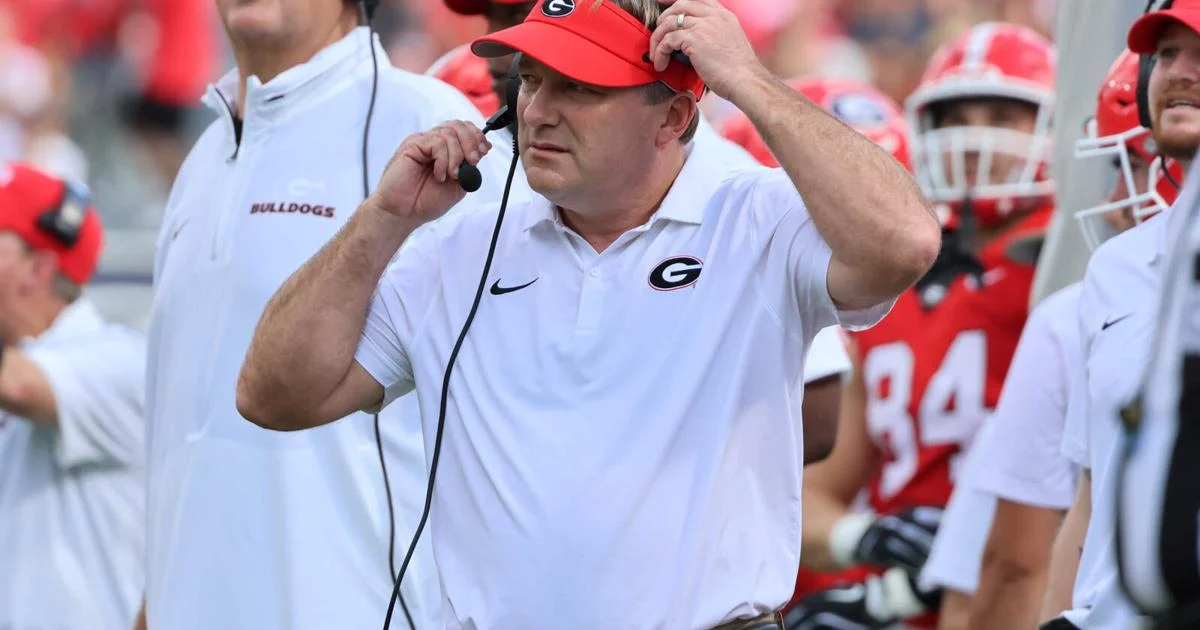Georgia football balances spring progress, faces looming NCAA shake-up
As spring practices unfold at the University of Georgia, one of the premier programs in college football, there is a noticeable buzz both on and off the field. Coming off a period of unparalleled success, including back-to-back National Championships in 2021 and 2022, the Bulldogs have maintained their elite status under head coach Kirby Smart. However, the team now faces a critical juncture in its legacy, balancing the progress of the 2025 spring season with the looming uncertainties surrounding potential NCAA reforms. This article will explore Georgia football’s spring progress, highlight key players and strategic changes, and examine how broader NCAA shifts could impact the team’s future.
The State of Georgia Football
Since taking the helm in 2016, Kirby Smart has transformed Georgia football into a powerhouse, consistently ranking as one of the top programs in the nation. Under his leadership, the Bulldogs have not only dominated the Southeastern Conference (SEC) but have also captured two National Championships in a span of just three years. This success has solidified Smart’s place as one of the premier coaches in the country, and his program has become a blueprint for sustained excellence.
The 2024 season brought with it a sense of déjà vu, with Georgia once again vying for another title but falling short in the College Football Playoff semifinals. The loss marked a new chapter for Georgia, as it began transitioning to the next wave of talent. Gone are some of the team’s key players from the past two seasons, including star quarterback Stetson Bennett and standout defensive lineman Jalen Carter. But as one era fades, another begins. The 2025 spring practices are a pivotal moment in the team’s journey, as Georgia looks to replace its departing stars while continuing to maintain its reputation as one of college football’s elite programs.
Spring Practices: The Next Generation of Bulldogs
Every spring, college football programs face a critical evaluation period, with returning players seeking to hone their skills and newcomers trying to make an immediate impact. For Georgia, the 2025 spring practices have been no different. The key themes of this year’s spring session are the development of a new quarterback, the continued evolution of a dominant defense, and the growth of younger players who will be asked to step into significant roles for the upcoming season.
Quarterback Transition: The Key to the Offense
The most talked-about development for Georgia this spring is undoubtedly the quarterback competition. With Stetson Bennett’s departure after leading the Bulldogs to two national titles, Georgia must now find a new leader under center. The team’s quarterback room is full of promising talent, with two players emerging as the main contenders: Carson Beck and Brock Vandagriff.
Carson Beck, a former 4-star recruit, has the edge in experience, having served as Bennett’s backup for the past couple of seasons. Beck has shown flashes of potential in limited action, but the spring practices represent his first true opportunity to take the reins of the offense. His development will be critical not just for Georgia’s hopes of contending for another National Championship, but also for ensuring continuity in a system that has become synonymous with success.
On the other hand, Brock Vandagriff, another highly touted recruit, brings a different skill set to the table. Known for his athleticism and strong arm, Vandagriff has the tools to be a dynamic playmaker, but he will need to prove that he can be consistent and operate within Georgia’s system. His potential as a dual-threat quarterback could offer Georgia a different dimension offensively, making the competition for the starting role particularly intriguing.
Defensive Dominance: Reloading, Not Rebuilding
One of the defining characteristics of Georgia football under Kirby Smart has been its defense. In recent years, the Bulldogs have boasted some of the most fearsome defenses in college football, with a lineage of elite defensive players like Jalen Carter, Nakobe Dean, and Travon Walker. Although several key defensive players have moved on to the NFL, including Carter, Georgia’s defense is poised to reload rather than rebuild.
This spring, much attention has been given to the linebacker corps, where several young players are expected to step up. Among the most exciting prospects is Jamon Dumas-Johnson, who had a breakout season in 2023 and is primed to lead the defense as a rising star. His leadership and ability to control the middle of the field will be crucial as Georgia looks to maintain its defensive dominance.
In addition, Georgia’s defensive line remains a formidable force, despite the departure of several high-profile talents. Players like Mykel Williams and Bear Alexander will be expected to step up and fill the void left by Carter and others. The Bulldogs’ defensive backfield, too, remains strong, with veterans like Kelee Ringo returning to provide stability and leadership in the secondary.
Georgia’s defense under Smart has always been about depth, and the program’s ability to develop talent on that side of the ball remains one of its biggest advantages. With spring practice underway, the Bulldogs are focused on fine-tuning their schemes and continuing to build the next generation of defensive standouts.
Offensive Line: The Backbone of the Offense
One of the areas where Georgia football will look to continue its dominance is in the trenches. The Bulldogs have long been known for their ability to control the line of scrimmage, and that is unlikely to change in 2025. Georgia’s offensive line remains one of the best in the nation, led by standout tackles like Broderick Jones and Warren McClendon. The team’s success will largely depend on the ability of this unit to protect the quarterback and create space for the running game.
This spring, the coaching staff is working to develop depth along the offensive line, with several new faces vying for starting spots. With a new quarterback taking the reins, the importance of solid protection cannot be overstated. If Georgia’s offensive line can maintain its standard of excellence, the Bulldogs will be in a strong position to compete at the highest level.
Skill Positions: Talent in the Backfield and on the Outside
Georgia has also long been known for its elite skill positions, with star running backs and wide receivers consistently making plays. This spring, there is no shortage of talent in both the backfield and at wide receiver. Running backs like Kendall Milton and Daijun Edwards are ready to carry the load, while freshmen like Roderick Robinson II offer a glimpse into the future of Georgia’s running game.
At wide receiver, the Bulldogs are looking for playmakers who can step into bigger roles after the departure of star wideout Ladd McConkey. With Brock Bowers, one of the nation’s top tight ends, still leading the receiving corps, Georgia’s offense will remain potent if it can develop reliable targets on the outside.
NCAA Shake-Up: What Does the Future Hold?
While the 2025 spring practices are essential for Georgia as the team looks to maintain its status as a national contender, there is another, much larger issue looming on the horizon: the potential shake-up of the NCAA itself. The landscape of college football has been undergoing a significant transformation in recent years, and the next few years could bring even more dramatic changes. Several factors are at play that could alter the course of the sport, and Georgia, like every other program, will be forced to adapt.
The Expansion of the College Football Playoff
One of the most significant developments in recent college football history is the expansion of the College Football Playoff (CFP). Beginning in 2024, the CFP will expand from 4 teams to 12, allowing more teams to compete for the National Championship. While this expansion opens the door for more programs to participate in the postseason, it also changes the dynamics of how teams approach the regular season and postseason.
For Georgia, the expanded playoff means that the pressure to go undefeated or win a conference title is lessened. The Bulldogs are likely to be a perennial playoff team, but they will now have more margin for error. The bigger question is how the expanded playoff will affect recruitment, scheduling, and player development. With more teams vying for spots, programs will have to be even more strategic in their approach to the season.
NIL and the Transfer Portal
Another major shift in college football is the rise of Name, Image, and Likeness (NIL) rights, which have revolutionized the way players can profit from their athletic talent. Alongside NIL, the transfer portal has made it easier for players to move between schools, leading to an increase in roster turnover. While these changes have given athletes more freedom, they have also created new challenges for programs like Georgia.
The Bulldogs, with their consistent success and resources, are well-positioned to capitalize on the NIL era. However, the new landscape also means increased competition for top talent, as schools across the country are able to offer financial incentives to attract top recruits. Georgia will need to continue to adapt to this new reality if it hopes to remain at the top of college football.
Conference Realignment
Conference realignment has also been a key factor in the evolving college football landscape. The SEC, which includes Georgia, has grown to include programs like Texas and Oklahoma, adding new layers of competition and intrigue to the conference. This realignment could have far-reaching consequences for the Bulldogs, both in terms of scheduling and recruiting.
As Georgia navigates the challenges posed by NCAA reforms, it will need to continue balancing its focus on player development, recruiting, and performance while also adjusting to the changing dynamics of the sport.
Looking Ahead
As Georgia football enters the 2025 season, the program finds itself at a crossroads. The team is in the midst of another spring practice session, with young players fighting for starting spots and established stars continuing to develop. However, as the NCAA faces potential changes in the coming years, Georgia will need to adapt to a rapidly evolving college football landscape.
For Kirby Smart and his staff, the goal remains the same: maintain Georgia’s position as one of the premier programs in the country. Whether it’s developing a new quarterback, refining the defense, or navigating the complexities of NIL and the transfer portal, the Bulldogs are well-equipped to handle the challenges ahead. As the NCAA undergoes its next major shake-up, Georgia will continue to strive for excellence, pushing forward with a new generation of talent while remaining rooted in the traditions of success that have defined the program for over a decade.



